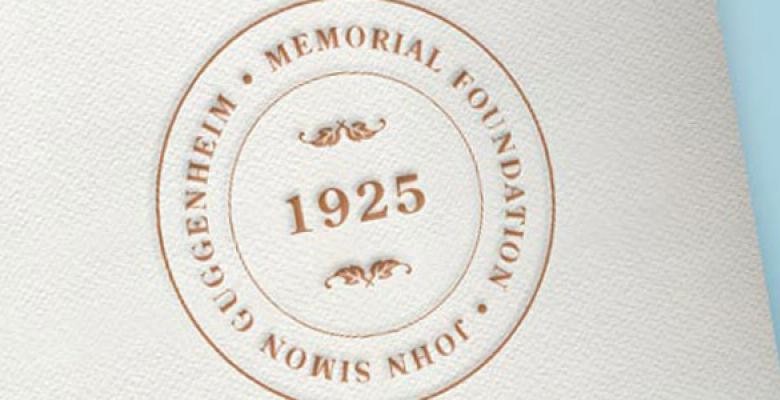Ten Faculty Members Receive Guggenheim Fellowships
Several full-time and adjunct professors at Columbia and Barnard, in disciplines ranging from dance to history to writing, were awarded prestigious Guggenheim Fellowships for 2014, based on their distinguished achievement and exceptional future promise.
They are among 178 scholars, artists and scientists chosen from nearly 3,000 applicants this year. The award comes with a grant from the John Simon Guggenheim Memorial Foundation to pursue their work. Since it was established in 1925, the Foundation has awarded over $315 million to more than 17,700 individuals.
This year's winners from Columbia and Barnard are:
Annie Baker is an award-winning playwright who serves as an adjunct professor and thesis adviser at Barnard. Her plays include "The Flick," "The Aliens," "Circle Mirror Transformation" and an adaptation of Chekhov’s "Uncle Vanya," for which she also designed the costumes. Her plays have been produced at over a dozen countries worldwide, including the Royal Court in London and Moscow Art Theatre.
Susan Bernofsky is associate professor and Director of Literary Translation in the writing program at the School of the Arts. Her many published translations include "Siddhartha," "The Black Spider," "The Metamorphosis" and seven of Robert Walser’s books. Her forthcoming translation of Jenny Erpenbeck’s novel "The End of Days" will be published in November 2014 and her new libretto for Mozart’s "The Magic Flute" is scheduled to premiere in May 2014 at the Opera Theatre of St. Louis.
Deborah Coen, associate professor of history and acting director of the Center of International History, joined Barnard's faculty in 2005. Her research centers on the history of the physical and earth sciences and the cultural history of central Europe. She is studying how climate came to be understood in terms of the exchange of energy among systems at a spectrum of scales, from the molecular to the hemispheric. Her recent publications include The Earthquake Observers: Disaster Science from Lisbon to Richter.
English and comparative literature professor Sarah Cole has written two books on modernism, "At the Violet Hour: Modernism and Violence in England and Ireland" and "Modernism, Male Friendship, and the First World War." She teaches courses across a range of modernist subjects, including lectures on major figures such as James Joyce and Virginia Woolf, and smaller seminars on themes in twentieth-century studies like literature, culture and war. Her published articles have appeared in ELH, Modern Fiction Studies, Modernism/Modernity, and PMLA.
Adjunct poetry professor Emily Fragos has edited five best-selling anthologies for the "Everyman's Pocket Library: The Letters of Emily Dickinson," "Music's Spell," "The Dance," "The Great Cat," and "Art & Artists." Her books of poems include "Little Savage" and "Hostage: New & Selected," the latter of which was considered for the National Book Critics Circle Award. Her poems have appeared in "The New Yorker," "Poetry," "Best American Poetry," "The American Poetry Review," "The New Republic," "The Paris Review," "The Boston Review," "Ploughshares," "Parnassus," "The Threepenny Review," "The Yale Review," "The Cimarron Review," "The Dish," and numerous other journals.
Professor Karl Jacoby, a faculty member of Columbia’s Center for the Study of Ethnicity and Race, joined Columbia’s history department in the fall of 2012. He has devoted his career to understanding the ways in which the making of the United States intertwined with the unmaking of a variety of other societies—from Native American nations to the communities of northern Mexico—and the ecologies upon which they rested. He is the author of two books, "Crimes Against Nature: Squatters, Poachers, Thieves," and the" Hidden History of American Conservation" and "Shadows at Dawn: A Borderlands Massacre and the Violence of History," as well as numerous essays and reviews.
Composer and virtuoso guitar player Arthur Kampela of the Graduate School of Arts and Sciences has fused popular and vernacular styles with contemporary textural techniques and has created an entirely new playing technique, extending it to many acoustic instruments. His 1988 CD Epopeia e Graca uses popular music forms and deconstructs samba, jazz, and musical theater. Recent compositional projects include "Migro," "Das Tripas Coracao," "Maquina do Mundo" and "Uma Faca So Lamina"—which premiered in May 2013 in New York City.
Hari Kunzru, adjunct associate professor of writing, is the author of the novels "The Impressionist," "Transmission," "My Revolutions," and "Gods Without Men," as well as a short-story collection, "Noise," and a novella, "Memory Palace." His short stories and essays have been translated into 20 languages and appeared in "The New York Times," "The New Yorker," "The Guardian," "London Review of Books," "Times of India," "Wired," "Book Forum," and "Frieze."
Andrea Miller, dance faculty member at Barnard, is the founder, artistic director, and choreographer of New York-based company Gallim Dance. She created a new work entitled "Fall, Recover, Recover" for this year's Barnard/Columbia Dances at Miller presentation. Miller’s choreography has been performed worldwide, including performances of "Blush" and "Wonderland" at the Brooklyn Academy of Music and the Théâtre National de Chaillot. Her commercial and art direction work is comprised of an installation for Hermès, Paris, movement work for VOGUE Diaries, choreography for the film "The Life and Death of Mick Rock," and an installation for Faberge.
Adjunct assistant professor of writing Julie Orringer is the author of two award-winning books of fiction: "The Invisible Bridge," currently being adapted for film, and "How to Breathe Underwater." Her work has appeared in the "Paris Review," "Yale Review," "Washington Post," "Ploughshares," and "McSweeney’s," and has been anthologized in "The Granta Book of the American Short Story" and "The Scribner Anthology of American Fiction." Orringer’s novel and story collection have been translated into 15 languages, adapted for stage and radio, and designated as required reading for university students. She is currently working on a novel about Varian Fry, the New York journalist who went to Marseille in 1940 to save writers and artists blacklisted by the Gestapo.
